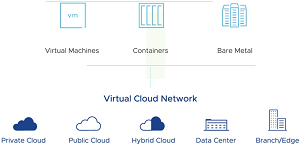News
VMware Updates Virtual Cloud for 'Modern Network Framework'
VMware announced updates to its Virtual Cloud Network, which it said embodies the idea of a "Modern Network framework" for the "new normal" of cloud and datacenter networking.
The company's Virtual Cloud Network addresses the changing nature of work and the changing boundaries of office and home, providing merged networking and security services along with reliable application access to cloud and Software-as-a-Service (SaaS) implementations for users who may be working from home, a branch office or some other remote location.
VMware said the Modern Network framework is described by three key pillars: Modern Application Connectivity Services; Multi-cloud Network Virtualization; and Physical Network Infrastructure.
 [Click on image for larger view.] VMware Virtual Cloud Network (source: VMware).
[Click on image for larger view.] VMware Virtual Cloud Network (source: VMware).
In being updated to embody the Modern Network framework, VMware said its software-centric cloud networking offering meets today's unique business needs such as:
- Application developers need to quickly deploy, test and iterate applications.
- The infrastructure powering applications needs to deliver the efficiency of cloud operating models.
- Applications need to run on everything from private clouds to public clouds to edge computing, and the user to application experience needs to be great, no matter the user's location
"Traditional hardware-centric networking models simply don't meet the needs of today's business realities," VMware said. "The Modern Network framework addresses all of these needs."
Specific updates to the Virtual Cloud Network include:
- New VMware SD-WAN work from home subscriptions for the company's Future Ready Workforce Solution, designed to help organizations set up a successful distributed workforce by rethinking where and how teams work.
-
A preview of a unique Attribute-Based Access Control policy model for VMware Tanzu Service Mesh, a new initiative that was announced at the company's recent VMworld event. Tanzu Service Mesh is built on VMware NSX, providing consistent operations and security across the end-to-end application transaction -- end users to services to data -- on any platform or cloud, the company says. VMware said the preview policy model "will bring 'who, what, where, when and how' simplicity into modern application policy creation."
VMware also announced upcoming NSX Advanced Load Balancer integration with Tanzu Service Mesh. "This integration will enable application developers using Kubernetes to launch an application with all required load balancing capabilities without ever having to touch the infrastructure. API driven, this combined solution will deliver high availability and security for modern applications via load balancing and web application firewall capabilities."
-
Infrastructure that measures and fixes itself through various means, including new network modeling capabilities that serve as a “pre-flight check” to ensure an application is reachable across both physical and virtual infrastructure. "Together, these new capabilities, which are available today, make troubleshooting faster and more efficient, and represent an important step towards self-healing networks," VMware said.
-
Network virtualization that runs on SmartNICs for the next generation of servers. SmartNICs, as the name implies, are network interface cards imbued with "intelligence" for advanced functionality, such as offloading processing from a host CPU.
"VMware announced Project Monterey, a collaboration with leading hardware providers to deliver network and server virtualization that runs on a SmartNIC," the company said. "This novel architecture promises a leap forward in computing power and efficiency, as well as pervasive, distributed security. Virtualization and security functions are offloaded to the SmartNIC, freeing up CPU cycles to run applications and creating meaningful cost savings.
"VMware is announcing that the NSX Services-Defined Firewall running on a Monterey SmartNIC will be able run stateful Layer 4 firewall services at line rate. These same SmartNICs will also be able to run Layer 7 stateful firewall, as well as VMware's curated IPS signatures. This capability will allow enterprise customers to attach a tuned, ultra-fast, ultra-smart firewall to their most valuable workloads -- the database apps that hold their sensitive data."
About the Author
David Ramel is an editor and writer at Converge 360.